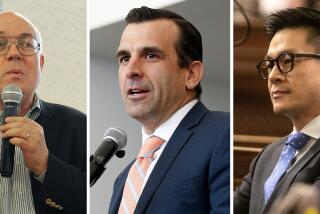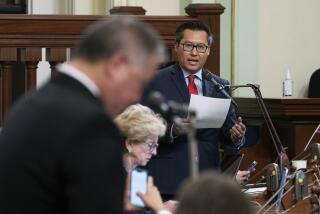California’s new election rules pose challenges for candidates
The fresh twists offered by California’s new election rules are challenging candidates gearing up for November to find ways to attract votes from the opposite party.
That could be key in the hottest races the June primary spawned, forcing many like-minded competitors to court voters they previously could have ignored.
The fall ballot will feature 28 contests between members of the same party: nine with Republicans and 19 with Democrats. Reaching for votes across party lines could be necessary to win in many of those cases. Doing so without alienating core supporters will be tricky.
“Nobody knows how to run these campaigns yet,” said USC political scientist Sherry Bebitch Jeffe, noting that it will take a few more elections until everyone adjusts to the new system.
But what is clear, she added, is that same-party candidates in tough races “do have to court the other voters. They have to.”
Before the new rules took effect this year, many races were essentially settled in the primary because their districts were drawn to favor one party. But new districts changed the mix of voters in some areas, and the “top two” primary was in wide use for the first time this year. Candidates in congressional, state Senate and Assembly offices all appeared on the same ballot, and the first- and second-place finishers advanced to the general election, regardless of party affiliation.
Campaign strategists accustomed to appealing to unaffiliated voters in close races will use familiar techniques to reach opposite-party voters: finding issues that trump ideology, obtaining endorsements from across the aisle and carefully wording their messages.
Candidates will have to be “more sophisticated and detail-oriented,” said Eric Hacopian, a Democratic consultant who has run campaigns for many nonpartisan offices.
Themes such as independence can be used by those who fit, to signal that a candidate is not tied to party dictates. Describing oneself as a “small business owner” can suggest practical experience in balancing a budget.
In one nationally watched battle, two seasoned liberals, Democratic Reps. Brad Sherman and Howard Berman, are vying for a newly drawn San Fernando Valley congressional seat. Early in the campaign, Sherman criticized Berman for sending out a letter wooing Republicans. But soon after he finished 10 percentage points ahead of Berman in the primary, Sherman said he too intended to court GOP voters.
“Republicans are going to be looking at both these guys and saying, ‘Gee, how do I pick?’” said Parke Skelton, Sherman’s campaign consultant, adding that Sherman’s emphasis on constituents’ problems boosts his appeal across party lines.
Of the few issues on which the two similarly inclined lawmakers differ, such as trade and fiscal policies, Sherman’s more conservative stance will sit better with Republicans, Skelton said. He cited the 2008 federal bailout of financial institutions, which Sherman said he refused to vote for until he won concessions to protect taxpayers.
But Brandon Hall, a Berman strategist, is betting Republicans and other voters in the 30th District will be drawn by Berman’s “years of demonstrated ability to work with members of both major parties to get things done.” One example was turning the gang-infested Hansen Dam area in the northeast Valley into a popular recreation spot.
Hall said Berman’s endorsements from Republicans including Sheriff Lee Baca, Dist. Atty. Steve Cooley, former L.A. Mayor Richard Riordan and county Supervisors Don Knabe and Michael D. Antonovich will help reinforce that campaign theme.
Voters in a very different congressional district, a conservative area that sprawls through San Bernardino, Inyo and Mono counties, have a strong history of electing Republicans. There, GOP anti-illegal-immigration crusader Gregg Imus narrowly finished first among 13 contenders in June. In the old days, he would have almost certainly been on his way to Washington.
But a second Republican, Assemblyman Paul Cook of Yucca Valley, won the other spot on the ballot, giving voters of the 8th District another politically viable option. Democrats, who make up nearly a third of the district’s registration, could make the difference in this contest.
Imus’ campaign manager, Chad Hanely, said his candidate’s positions, especially those against illegal immigration, gun control and tax increases, “are on common ground with everybody. Those are things Democrats and Republicans in this district agree on.”
Cook’s campaign manager, Jim Rissmiller, said Cook’s “track record of working with all sides on tough issues” will attract voters of all stripes. He cited, among other examples, a 2009 measure Cook co-wrote with Assemblyman Mark Leno (D-San Francisco) that placed greater restrictions on sex offenders in the workplace.
The two Republicans competing for an Inland Empire congressional seat won’t be shy about appealing to Democrats, either, their campaigns say — and they won’t need to downplay their party affiliation.
State Sen. Bob Dutton of Rancho Cucamonga believes his long local ties will appeal across party lines as he vies with Rep. Gary Miller of Diamond Bar for the newly drawn 31st Congressional District, said Dutton’s campaign manager, Clint Lorimore. Despite Democrats’ five-point edge in registration there, Miller and Dutton finished first and second, respectively, in the primary.
“Bob’s been in San Bernardino County for 37 years,” Lorimore said.
Dutton’s Senate district overlaps 60% of the congressional district, and he is used to working with constituents who are from other parties or unaffiliated, Lorimore added.
Miller’s campaign manager, Chris Marsh, said his candidate won’t need to appeal differently to Democrats than to his fellow Republicans. Voters in this contest care most about two issues, Marsh said: jobs and the economy.
“Those are bipartisan issues,” he said. “We don’t have to change our message” — more jobs for a better economy — when talking to Democrats or nonpartisan voters.
“Congressman Miller’s been working for 14 years” on those issues, Marsh said, “and that’s what we plan to talk about to every voter.”
More to Read
Start your day right
Sign up for Essential California for news, features and recommendations from the L.A. Times and beyond in your inbox six days a week.
You may occasionally receive promotional content from the Los Angeles Times.







